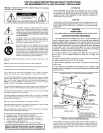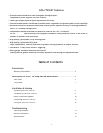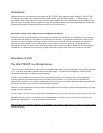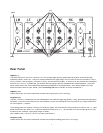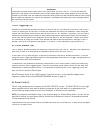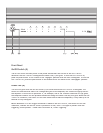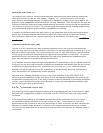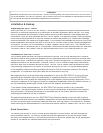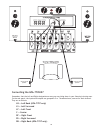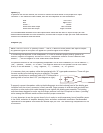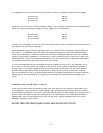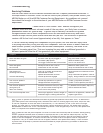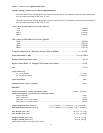
Troubleshooting
Resolving Problems
Use the chart below to solve common situations that don’t require professional attention. If
the steps stated in POSSIBLE SOLUTION do not resolve your problem, then please contact your
ADCOM Dealer or call the ADCOM Customer Service Department. Any problems not covered
here should be brought to the attention of your ADCOM Dealer or ADCOM Customer Service
Department.
A special note on “hum”
A special note on “hum”
: When there is a low-volume “hum” audible throughout your
speakers, even with the main volume turned all the way down, you likely have a common
phenomenon known as “ground loop.” A ground loop is basically a difference in ground
voltages between two or more components which are connected electrically and which
creates multiple current paths where there must only be one. This difference in potential
creates a 60 Hz low-level sound (approximately a low A#), that appears to “hum.”
It can be caused by adding new components to your system, but that does not imply there
is anything electrically wrong with any new component. With the advent of audio/video and
home theater systems, the problem has become commonplace. Generally, the cause is the
Cable-TV incoming signal line. This new incoming line may add an additional ground at a
different potential from the AC line ground of your other equipment.
Note 1:
Cable TV systems can sometimes contribute to ground-loop problems which cause “hum.” To determine if
your cable system is the contributing factor, disconnect the Cable-TV incoming signal line (round, 75Ω) at the wall,
or the rst component to which the cable is connected to ( i.e. the cable box, or VCR.) If the hum is no longer
present, you must insert a “75Ω Ground Loop Isolator” before reconnecting the line. You should check with your
ADCOM Dealer to obtain one. If the “75Ω Ground Loop Isolator” works only partially or not at all, then please read
Note 2 to complete the troubleshooting procedure.
Note 2:
Make sure that the power ampli er is at least six inches from the Preamp and/or Processor. Usually putting
another component between them is suf cient to minimize the hum. If this does not reduce the hum, turn the
system off and disconnect all Inputs from the ampli er. If the hum still persists, then call your Dealer or Service
Center. If the hum disappears, re-connect one RCA cable at a time to see if the speci c cable or component is
responsible. If any or all cables cause the hum to appear, subsitute with replacement cable(s). If hum continues
to persist then the preamp or processor should be evaluated for proper operation by your Dealer or Authorized
Service Center.
13
Symptom
Power LED does not glow
No sound
Power LED glows,
but no sound
One channel not
producing sound and/or
Thermal LED Blinking
Hum from all speakers
at any volume
Hum from all speakers
(hum goes up or
down with volume)
Hum from the ampli er itself
Possible Reason
AC Power Cord
(
4
)
not plugged in
AC Breaker
(
3b
)
opened
12V Trigger Connected but not activated
Preamp or source unit is not on
Connections in rear are loose
Input
(
1
)
or Output
(
2
)
connectors
disconnected or loose
Speaker disconnected/ shorted
Internal protection engaged
Ground loop (difference in ground
voltages between components)
Problems with source unit (CD, tape,
etc.) or RCA cables connecting that
source unit to the preamp
Some major appliance, dimmer, halogen or
uorescent light is creating interference
Possible Solution
Plug in AC Power Cord
(
4
)
Reset AC Breaker
(
3b
)
Turn on 12V Source Unit
Make sure whole system is on
Verify all connections on rear of amp
Verify both sets of connections on that
channel
Verify connections at speaker/ cable in-
tegrity. Bring to Dealer or Service Center
If cable TV is present
(see Note 1)
If cable TV is not present
(see Note 2)
Try different source (tuner, tape, etc.)
and/or different RCA cable
Make sure all appliances, dimmers and
suspect lights are off




